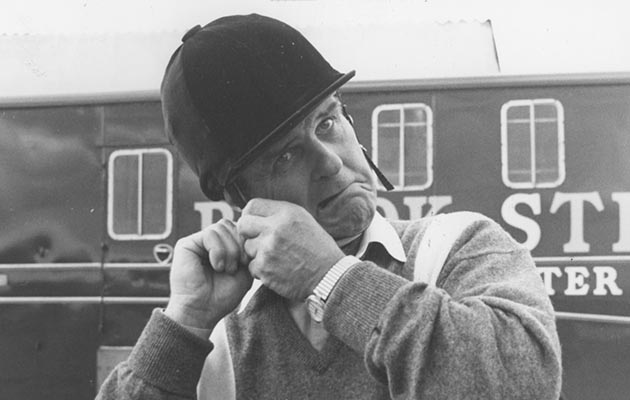From Trojan horses to currying favour, everyday expressions are laced with references to the part horses played throughout our culture and history. Author Adam Jacot de Boinod traces the origins of some popular idioms
“Dark horse”, “stalking horse” and “horseplay”… the English language is rich with equestrian idioms. Animals, of course, have long been a deep well of examples from which we draw to make helpful comparisons and precise references. They perform many roles in our lives and perhaps none more so than the horse.
The horse is involved in everything from historic warfare to man’s “cavalier” status and medieval jousting, from agriculture to transport, not to mention the world of racing, so it comes as no surprise just how richly the horse has been put to linguistic use.
What’s so interesting, and sometimes truly eyebrow-raising, is the origin and true definition of these phrases and idioms.
{"content":"PHA+SXTigJlzIGhhcmQgdG8gZ28gYW55IGVhcmxpZXIgd2l0aGluIHRoZSBjYW5vbiBvZiBFdXJvcGVhbiBsaXRlcmF0dXJlIHRoYW4gR3JlZWsgbXl0aG9sb2d5LCB3aGVyZSB0aGUg4oCcVHJvamFuIGhvcnNl4oCdIHJlZmVycyB0byBhbiBlcGlzb2RlIGluIHdoaWNoIHRoZSBUcm9qYW5zIGRyYWdnZWQgYW4gYWJhbmRvbmVkIHdvb2RlbiBob3JzZSB3aXRoaW4gdGhlaXIgY2l0eSBnYXRlcy4gSXQgd2FzIHNlY3JldGx5IGZ1bGwgb2YgR3JlZWsgc29sZGllcnMgd2hvIGF0IG5pZ2h0IHRoZW4gc3RvbGUgb3V0IG9mIGNvbmNlYWxtZW50LCBzbGV3IHRoZSBndWFyZHMgYW5kIG9wZW5lZCB0aGUgZ2F0ZXMgdG8gc2V0IGZpcmUgdG8gdGhlIGNpdHkgb2YgVHJveS48L3A+CjxwPkluZGVlZCBmb3IgY2VudHVyaWVzIHdhcnMgYW5kIGJhdHRsZXMgd2VyZSBkZXBlbmRlbnQgb24gaG9yc2VzIGZvciB0aGVpciBzdWNjZXNzLiBXZSBoYXZlIHRoZSBleHByZXNzaW9uIOKAnG9sZCB3YXIgaG9yc2XigJ0sIGFuZCBob3JzZXMgbmF0dXJhbGx5IGJlY2FtZSBzb21ldGhpbmcgb2YgYSBzdGF0dXMgc3ltYm9sOiBhIGJpdCBsaWtlIGEgc3BvcnRzIGNhciB0b2RheS48L3A+CjxwPjxkaXYgY2xhc3M9ImFkLWNvbnRhaW5lciBhZC1jb250YWluZXItLW1vYmlsZSI+PGRpdiBpZD0icG9zdC1pbmxpbmUtMiIgY2xhc3M9ImlwYy1hZHZlcnQiPjwvZGl2PjwvZGl2PjxzZWN0aW9uIGlkPSJlbWJlZF9jb2RlLTMxIiBjbGFzcz0iaGlkZGVuLW1kIGhpZGRlbi1sZyBzLWNvbnRhaW5lciBzdGlja3ktYW5jaG9yIGhpZGUtd2lkZ2V0LXRpdGxlIHdpZGdldF9lbWJlZF9jb2RlIHByZW1pdW1faW5saW5lXzIiPjxzZWN0aW9uIGNsYXNzPSJzLWNvbnRhaW5lciBsaXN0aW5nLS1zaW5nbGUgbGlzdGluZy0tc2luZ2xlLXNoYXJldGhyb3VnaCBpbWFnZS1hc3BlY3QtbGFuZHNjYXBlIGRlZmF1bHQgc2hhcmV0aHJvdWdoLWFkIHNoYXJldGhyb3VnaC1hZC1oaWRkZW4iPg0KICA8ZGl2IGNsYXNzPSJzLWNvbnRhaW5lcl9faW5uZXIiPg0KICAgIDx1bD4NCiAgICAgIDxsaSBpZD0ibmF0aXZlLWNvbnRlbnQtbW9iaWxlIiBjbGFzcz0ibGlzdGluZy1pdGVtIj4NCiAgICAgIDwvbGk+DQogICAgPC91bD4NCiAgPC9kaXY+DQo8L3NlY3Rpb24+PC9zZWN0aW9uPjwvcD4KPHA+VGhlIHBocmFzZSDigJxteSBraW5nZG9tIGZvciBhIGhvcnNl4oCdIGlzIHVzZWQgdHlwaWNhbGx5IHRvIGVtcGhhc2lzZSBob3cgaW1wb3J0YW50IGEgdXN1YWxseSBpbnNpZ25pZmljYW50IGl0ZW0gaXMgYXQgYSBnaXZlbiBtb21lbnQuIEl0IHdhcyBjb2luZWQgYnkgU2hha2VzcGVhcmUgaW4gUmljaGFyZCBJSUkgYW5kIHJlZmVycyBib3RoIHRvIGEga2luZyB3aG8gbWlnaHQgbG9zZSBoaXMga2luZ2RvbSBmcm9tIGxvc2luZyBoaXMgaG9yc2UgYW5kIHRvIHRoZSBmYWN0IHRoYXQgc29tZXRoaW5nIHNtYWxsIG91dHdlaWdocyBhIGtpbmdkb20gYXQgdGhhdCBtb21lbnQuPC9wPgo8cD5Tb2NpYWwgcHJvd2VzcyBpbnRyb2R1Y2VkIHRoZSBwaHJhc2VzIOKAnHRvIGJlIG9uIG9uZeKAmXPCoGhpZ2ggaG9yc2XigJ0gb3Ig4oCcdG8gZ2V0IG9mZiB5b3VyIGhpZ2ggaG9yc2XigJ0uIFRoZXkgYXJlIGEgMTM4MCByZWZlcmVuY2UgdG8gYXJyb2dhbmNlOyB0aG9zZSBpbiBjb21tYW5kIGNob3NlIHRoZSBiaWdnZXN0IGhvcnNlcyBhcyBhIGRpc3BsYXkgb2YgdGhlaXIgcG93ZXIgYW5kLCByaWRpbmcgaGlnaCBhYm92ZSB0aGUgY3Jvd2RzLCB0aGV5IGNvdWxkIGFwcGVhciB0byBhY3QgYXMgaWYgdGhleSB3ZXJlIGJldHRlciB0aGFuIHRob3NlIGJlbG93LjwvcD4KPHA+Tm90aW9ucyBvZiDigJxjaGl2YWxyeeKAnSBkZXZlbG9wZWQgaW4gbWVkaWV2YWwgdGltZXMgd2l0aCBsYW5jZXMgYW5kIGpvdXN0aW5nIGJyaW5naW5nIHVzIOKAnGF0IGZ1bGwgdGlsdOKAnS4gSXQgZGVyaXZlcyBmcm9tIHRoZSBvbGQgRW5nbGlzaCB3b3JkIOKAnHRlYWx04oCdIG9yIOKAnHR5bHRl4oCdLCBtZWFuaW5nIHRvIHRvdHRlciB1bnN0ZWFkaWx5LiBUaWx0aW5nIGlzIGFuIGVhcmx5IG5hbWUgZm9yIGpvdXN0aW5nIHdoZXJlIHR3byBrbmlnaHRzIGNoYXJnZSBhdCBlYWNoIG90aGVyIG9uIGhvcnNlYmFjayBpbiBhbiBhdHRlbXB0IHRvIHRvcHBsZSB0aGVpciBvcHBvbmVudCBvZmYgaGlzIGhvcnNlLjwvcD4KPGRpdiBjbGFzcz0iYWQtY29udGFpbmVyIGFkLWNvbnRhaW5lci0tbW9iaWxlIj48ZGl2IGlkPSJwb3N0LWlubGluZS0zIiBjbGFzcz0iaXBjLWFkdmVydCI+PC9kaXY+PC9kaXY+CjxwPkV4cGVydGlzZSBhdCByaWRpbmcgYWxzbyBnYXZlIHVzIOKAnGhlbGwgZm9yIGxlYXRoZXLigJ0gbWVhbmluZyDigJxhcyBmYXN0IGFzIHBvc3NpYmxl4oCdLiBUaGUgcGhyYXNlIGNvbWVzIG1vc3QgbGlrZWx5IGZyb20gUnVkeWFyZCBLaXBsaW5nIGFuZCByZWZlcnMgdG8gYSBob3JzZW1hbiByaWRpbmcgZmFzdCBieSBwdXR0aW5nIGEgbG90IG9mIHdlYXIgaW50byBoaXMgbGVhdGhlciBzYWRkbGUsIHRodXMgZXhjaGFuZ2luZyDigJxoZWxsIGZvciBsZWF0aGVy4oCdLjwvcD4KPHA+VGhlIGFncmljdWx0dXJhbCBkZW1hbmQgaW1wb3NlZCBvbiBob3JzZXMgZm9yIHB1bGxpbmcgcGxvdWdocyBhbmQgc28gb24gYXJlIGV4ZW1wbGlmaWVkIGJ5IHBocmFzZXMgc3VjaCBhcyDigJx0byB3b3JrIGxpa2UgYSBob3JzZeKAnSBhbmQgdGhlIHR1cm5pbmcgb2YgdGhlbSBpbnRvIGEgY29tbW9kaXR5IGlzIGV4ZW1wbGlmaWVkIGJ5IHRoZSB3b3JkIOKAnGhvcnNlLXRyYWRpbmfigJ0uPC9wPgo8ZGl2IGNsYXNzPSJhZC1jb250YWluZXIgYWQtY29udGFpbmVyLS1tb2JpbGUiPjxkaXYgaWQ9InBvc3QtaW5saW5lLTQiIGNsYXNzPSJpcGMtYWR2ZXJ0Ij48L2Rpdj48L2Rpdj4KPHA+Q2xlYXJseSBob3JzZXMgd2VyZSBrZXkgd2hlbiBpdCBjYW1lIHRvIGdlbmVyYWwgdHJhbnNwb3J0YXRpb24gaW5pdGlhbGx5IGJ5IHJpZGluZzogaGVuY2UgdG8g4oCccmlkZSByb3VnaHNob2Qgb3ZlciBzb21lb25l4oCdLCB3aGljaCBjb21lcyBmcm9tIHRoZSBkYXlzIHdoZW4gaXQgd2FzIHRoZSBub3JtIHRvIHJpZGUgcm91Z2gtc2hvZCBob3JzZXMgaW4gd2hpY2ggdGhlIG5haWwtaGVhZHMgb2YgdGhlIGhvcnNlc2hvZXMgd2VyZSBsZWZ0IHN0aWNraW5nIG91dCBzbyB0aGF0IHRoZXkgY291bGQgYmUgcmlkZGVuIGFueXdoZXJlIHdpdGhvdXQgc2xpcHBpbmcuPC9wPgo8cD7igJxUbyBjb21lIGEgY3JvcHBlcuKAnSBtYXkgZGVyaXZlIGZyb20gdGhlIGhpbmRxdWFydGVycyBvZiBhIGhvcnNlIOKAkyB0aGUgY3JvdXAuIFdoZW4gZmFsbGluZyBmcm9tIGEgaG9yc2UgaW4gdGhlIDE4dGggY2VudHVyeSwgeW91IHdlcmUgc2FpZCB0byBoYXZlIGZhbGxlbiDigJxuZWNrIGFuZCBjcm9w4oCdLCBtZWFuaW5nIGhlYWRsb25nIG9yIGhlYWQgb3ZlciBoZWVscywgd2hpbGUg4oCcZG9u4oCZdCBjaGFuZ2UgaG9yc2VzIGluIG1pZC1zdHJlYW3igJ0gZGVyaXZlcyBmcm9tIEFicmFoYW0gTGluY29sbiBvZmZlcmluZyBoaW1zZWxmIGFzIGEgcHJlc2lkZW50aWFsIGNhbmRpZGF0ZSwgaW4gd2hpY2ggaGUgc2FpZCwg4oCcQW4gb2xkIER1dGNoIGZhcm1lciBvbmNlIHJlbWFya2VkIHRoYXQgaXQgd2FzIG5vdCBiZXN0IHRvIHN3YXAgaG9yc2VzIHdoZW4gY3Jvc3Npbmcgc3RyZWFtcy7igJ08L3A+CjxkaXYgY2xhc3M9ImFkLWNvbnRhaW5lciBhZC1jb250YWluZXItLW1vYmlsZSI+PGRpdiBpZD0icG9zdC1pbmxpbmUtNSIgY2xhc3M9ImlwYy1hZHZlcnQiPjwvZGl2PjwvZGl2Pgo8cD5UaGVuIGNhbWUgbW92aW5nIGFyb3VuZCBieSBkaW50IG9mIGEgY29hY2ggYW5kIGhvcnNlcywgYnJpbmdpbmcgdXMg4oCcY2FydCBiZWZvcmUgaG9yc2XigJ0sIGFuIGFuYWxvZ3kgZm9yIGRvaW5nIHRoaW5ncyBpbiB0aGUgd3Jvbmcgb3JkZXIuPC9wPgo8cD5TdGFibGVzIGhhZCBiZWNvbWUgY29tbW9ucGxhY2UsIGFuZCBzaG9ydGx5IGFmdGVyIHRoZSBpZGlvbSDigJxIb2Jzb27igJlzIGNob2ljZeKAnSwgbWVhbmluZyBhIGNob2ljZSB0aGF0IGlzIG5vIGNob2ljZSBhdCBhbGwgYW5kIHJlZmVycmluZyB0byBhIE1yIEhvYnNvbiwgYW4gaW5ua2VlcGVyIGF0IENhbWJyaWRnZSB3aG8gaGFkIGEgc3RhYmxlIG9mIDQwIGhvcnNlcy4gV2hlbiBzb21lb25lIGNhbWUgZm9yIGEgaG9yc2UgaGUgd2FzIG9ibGlnZWQgdG8gdGFrZSB0aGUgb25lIG5lYXJlc3QgdGhlIHN0YWJsZSBkb29yIG9yIGdvIHdpdGhvdXQgb25lLCBzbyB0aGF0IGV2ZXJ5IGN1c3RvbWVyIHdhcyBzZXJ2ZWQgaW4gZXF1YWwgZmFzaGlvbi48L3A+CjxwPk5leHQgdXAgd2FzIGhvcnNlIHJhY2luZywgYnJpbmdpbmcgd2l0aCBpdCBhIHBsZXRob3JhIG9mIHRlcm1zIGluY2x1ZGluZyDigJxkZWFkIGhlYXTigJ0sIOKAnGZhbGwgYXQgdGhlIGZpbmFsIGh1cmRsZeKAnSBhbmQg4oCcdG8gZmxvZyBhIGRlYWQgaG9yc2XigJ0uIFdpdGggdGhpcyBsYXN0IHBocmFzZSBpcyB0aGUgc2Vuc2UgdGhhdCBub3RoaW5nIGNvdWxkIGJlIGRvbmUgaWYgdGhlIGhvcnNlIHdlcmUgYWxyZWFkeSBkZWFkIGFuZCwgbGlrZXdpc2UsIGlmIHNvbWV0aGluZyBoYXMgYmVlbiBkZWNpZGVkLCBubyBhbW91bnQgb2YgZGlzY3Vzc2lvbiBjb3VsZCBjaGFuZ2UgaXQuPC9wPgo8cD5CZXR0aW5nIGluZXZpdGFibHkgYnJvdWdodCBvdXQgaXRzIG93biBsaW5nbyB3aXRoIOKAnHR1cm4tdXAgZm9yIHRoZSBib29r4oCdLCDigJxiYWNrIHRoZSB3cm9uZyBob3JzZeKAnSBhbmQg4oCcc3RyYWlnaHQgZnJvbSB0aGUgaG9yc2XigJlzIG1vdXRo4oCdOiB0aGUgbGFzdCByZWZlcnJpbmcgdG8gaGVhcmluZyB0aXBzIGZyb20gdGhvc2Ugd2hvIGhhdmUgYmVlbiBpbiBjbG9zZXN0IHRvdWNoIHdpdGggdGhlIHJlY2VudCBmb3JtIG9mIHRoZSBob3JzZS48L3A+CjxwPkFtZXJpY2Fuc+KAmSBsb3ZlIG9mIHRoZSBzcG9ydCBjb2luZWQgbWFueSBhIHBocmFzZSBzdWNoIGFzIOKAnGFjcm9zcyB0aGUgYm9hcmTigJ0sIOKAnEJpZyBBcHBsZeKAnSwg4oCcZ28gZG93biB0byB0aGUgd2lyZeKAnSBhbmQg4oCcdG8gc3BpbGwgdGhlIGJlYW5z4oCdIOKAkyB0aGUgbGF0dGVyIGV4cHJlc3Npb24gYXJpc2luZyBpbiB0aGUgZWFybHkgMTkwMHMgaW4gdGhlIHNlbnNlIG9mIGRpc3NlbWluYXRpbmcgaW5mb3JtYXRpb24sIHRob3VnaCBpdCBkYXRlcyBiYWNrIHRvIFJvbWFuIHRpbWVzLCB3aGVuIHBlb3BsZSBmZWQgYmVhbnMgdG8gaG9yc2VzIHRvIGdpdmUgdGhlbSBtb3JlIGVuZXJneS4g4oCcRnVsbCBvZiBiZWFuc+KAnSBoYXMgc2ltaWxhciBvcmlnaW5zLjwvcD4KPHA+4oCcQWNyb3NzIHRoZSBib2FyZOKAnSDigJMgbWVhbmluZyBldmVyeXRoaW5nIGluIGFuIG9yZ2FuaXNhdGlvbiDigJMgY29tZXMgZnJvbSBhIDE5MDIgcmFjaW5nIHRlcm0gaW4gdGhlIFVTLCBkZW5vdGluZyBhIGJldCBpbiB3aGljaCBlcXVhbCBhbW91bnRzIGFyZSBzdGFrZWQgb24gdGhlIHNhbWUgaG9yc2UgdG8gY29tZSBmaXJzdCwgc2Vjb25kLCBvciB0aGlyZCBpbiBhIHJhY2U7IHRoZSBib2FyZCB3YXMgdGhlIGJsYWNrYm9hcmQgb24gd2hpY2ggYm9va21ha2VycyBjaGFsa2VkIHVwIHRoZWlyIG9kZHMuPC9wPgo8cD5UaGUgQmlnIEFwcGxlLCBOZXcgWW9yayBDaXR54oCZcyBuaWNrbmFtZSwgbW9zdCBsaWtlbHkgZGVyaXZlcyBmcm9tIHRoZSAxOTIwcywgd2hlbiB0aGUgYmlnZ2VzdCBwdXJzZSBmb3Igd2lubmluZyBhIHJhY2Ugd2FzIGNhbGxlZCDigJx0aGUgYXBwbGXigJ07IGhlbmNlIGJvdGggam9ja2V5cyBhbmQgb3duZXJzIHVzZWQg4oCcdGhlIEJpZyBBcHBsZeKAnSBmb3IgdGhlIGNpdHkgd2hlcmUgdGhlIG1vc3QgbHVjcmF0aXZlIHByaXplcyB3ZXJlIGF3YXJkZWQuPC9wPgo8cD7igJxHb2luZyB0byB0aGUgd2lyZeKAnSDigJMgdXNlZCB0byByZWZlciB0byBhbnkgdGVuc2Ugc2l0dWF0aW9uIHdoZXJlIHRoZSBvdXRjb21lIG1heSB3ZWxsIG5vdCBiZSBkZWNpZGVkIHVudGlsIHRoZSB2ZXJ5IGVuZCDigJMgY29tZXMgZnJvbSAxODg5IGluIEFtZXJpY2FuIHJhY2luZywgd2hlcmUgYSB3aXJlIHdhcyBwdXQgdXAgYWJvdmUgdGhlIGZpbmlzaGluZyBsaW5lIHRvIGFzc2lzdCBpbiBkZXRlcm1pbmluZyB0aGUgd2lubmVyIGJlZm9yZSB0aGUgZGF5cyBvZiBjYW1lcmFzIHRvIGluZGljYXRlIHdoaWNoIG5vc2UgaGFkIGNyb3NzZWQgdGhlIGxpbmUgZmlyc3QuIEFueSByYWNlIHRoYXQgd2FzIHZlcnkgY2xvc2Ugd2FzIGRlc2NyaWJlZCBhcyBnb2luZyBkb3duIHRvIHRoZSB3aXJlLjwvcD4KPHA+QSBob3JzZeKAmXMgbmVlZCBmb3IgZm9vZCBpcyBleHByZXNzZWQgd2l0aCDigJx0byBlYXQgbGlrZSBhIGhvcnNl4oCdLCBhbmQg4oCcdG8gYml0ZSB0aGUgaGFuZCB0aGF0IGZlZWRzIG9uZeKAnSBjb21lcyBmcm9tIHRoZSBpZGVhIHRoYXQgaG9yc2VzLCBpZiB5b3XigJlyZSBjYXJlbGVzcywgbWF5IGJpdGUgd2hlbiB5b3UgZmVlZCB0aGVtIGJ5IGhhbmQuIEFzIGZvciDigJx5b3UgY2FuIGxlYWQgYSBob3JzZSB0byB3YXRlciBidXQgeW91IGNhbuKAmXQgbWFrZSBpdCBkcmlua+KAnSwgaXQgaWxsdXN0cmF0ZXMgdGhhdCBwZW9wbGUsIGxpa2UgaG9yc2VzLCB3aWxsIGRvIGFzIHRoZXkgd2lsbC48L3A+CjxwPkEgaG9yc2XigJlzIGNoYXJhY3RlciBnaXZlcyB1cyDigJxob3JzZXBsYXnigJ0uIENvaW5lZCBpbiB0aGUgMTU4MHMsIOKAnGhvcnNl4oCdIG1lYW50IGFueXRoaW5nIHN0cm9uZywgYmlnIG9yIGNvYXJzZTsgc28gaG9yc2VwbGF5wqBtZWFudMKgc3Ryb25nIHBsYXkgKHdoaWNoIGlzIGFsc28gdGhlIGJhc2lzIG9mIHRoZSB3b3JkIGhvcnNlcmFkaXNoKS48L3A+CjxwPkFsc28g4oCcdG8gY3VycnkgZmF2b3Vy4oCdIGNhbWUgd2l0aCDigJxjdXJyeeKAnSBtZWFuaW5nIHRvIHJ1YiBkb3duIG9yIGNvbWIgYSBob3JzZSB3aGlsZSDigJxmYXZvdXLigJ0gY29tZXMgZnJvbSB0aGUgRnJlbmNoIOKAnGZhdXZl4oCdIGZvciB0YXdueS1jb2xvdXJlZCBvciB3aWxkOyB0aGUgc2Vuc2UgYmVpbmcgdGhhdCB0aGUgaG9yc2Ugd2FzIHN1c2NlcHRpYmxlIHRvIGZsYXR0ZXJ5LCB3aGljaCBmaWd1cmF0aXZlbHkgaXMgYSBmb3JtIG9mIHN0cm9raW5nLjwvcD4KPHA+TGFzdCBidXQgbm90IGxlYXN0IGFyZSBhIGhvcnNl4oCZcyBwaHlzaWNhbCBwcm9wZXJ0aWVzLCBleGVtcGxpZmllZCB3aXRoIHRoZSBhZ2Utb2xkIG1heGltOiDigJxuZXZlciBsb29rIGEgZ2lmdCBob3JzZSBpbiB0aGUgbW91dGjigJ0gbWVhbmluZyBvbmUgc2hvdWxkIGFjY2VwdCBhIGdpZnQgYXMgaXQ8YnIgLz4KaXMgZ2l2ZW4gaW5zdGVhZCBvZiB0cnlpbmcgdG8gZ2V0IHNvbWV0aGluZyBiZXR0ZXIuIElmIHNvbWVvbmUgd2FzIGdpdmVuIGEgaG9yc2UgYW5kIHRyaWVkIHRvIGNoZWNrIGl0cyB0ZWV0aCBhbmQgdGhlcmVieSBpdHMgYWdlLCBpdCBtZWFudCB0aGF0IGluc3RlYWQgb2YgYmVpbmcgZ3JhdGVmdWwgZm9yIHRoZSBwcmVzZW50IGhlIHdhcyBydWRlbHkgdHJ5aW5nIHRvIGFzc2VzcyBpdHMgdmFsdWUuPC9wPgo8ZGl2IGNsYXNzPSJpbmplY3Rpb24iPjwvZGl2Pgo8cD5PdGhlciBkZW50YWwgaW5zcGVjdGlvbiBjb21lcyB3aXRoIOKAnGxvbmcgaW4gdGhlIHRvb3Ro4oCdIG1lYW5pbmcgc29tZW9uZSBvbGQgb3IgYWdlZC4gSG93ZXZlciBwb29yIHdlIGFyZSBhdCB0ZWxsaW5nIGEgaG9yc2XigJlzIGFnZSBieSBpdHMgdGVldGgsIHdlIGFsbCBrbm93IHRoZXkgZ2V0IGxvbmdlciBhcyB0aGUgeWVhcnMgZ28gYnkuPC9wPgo8cD7igJxIb3JzZXMgZm9yIGNvdXJzZXPigJ0gYWNyb3NzIG1hbnkgY2VudHVyaWVzIGluZGVlZCE8L3A+CjxwPuKXjyBBZGFtIEphY290IGRlIEJvaW5vZCB3YXMgYSByZXNlYXJjaGVyIGZvciB0aGUgZmlyc3QgQkJDIHNlcmllcyBvZiA8ZW0+UUk8L2VtPiBhbmQgaXMgYW4gYXV0aG9yIG9mIHRocmVlIGJvb2tzIGluY2x1ZGluZyA8ZW0+VGhlIE1lYW5pbmcgb2YgVGluZ288L2VtPjwvcD4KPHA+PGVtPlJlZjogSG9yc2UgJmFtcDsgSG91bmQ7IDMgRGVjZW1iZXIgMjAyMDwvZW0+PC9wPgo8cD4K"}
You may also be interested in:




